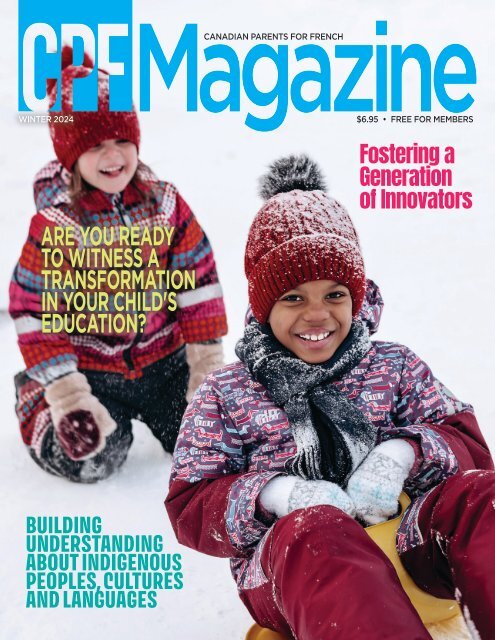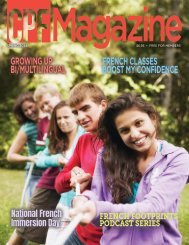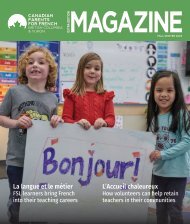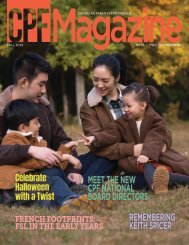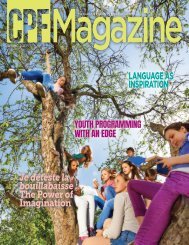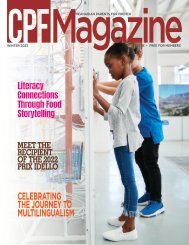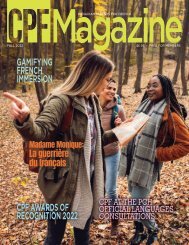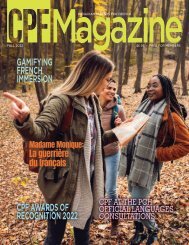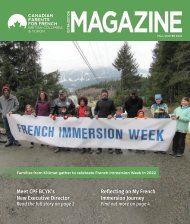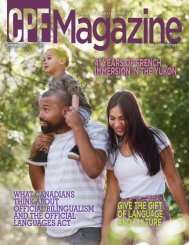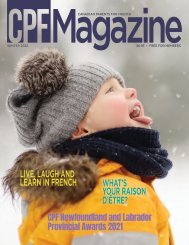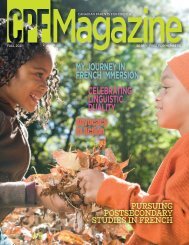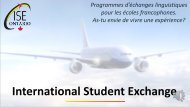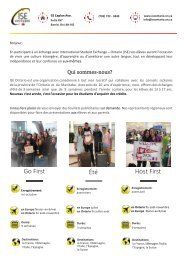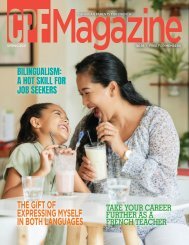CPF Magazine Winter 2024 Issue
A national network of volunteers, parents and stakeholders who value French as an integral part of Canada. CPF Magazine is dedicated to the promotion and creation of French-second-language learning opportunities for young Canadians.
A national network of volunteers, parents and stakeholders who value French as an integral part of Canada. CPF Magazine is dedicated to the promotion and creation of French-second-language learning opportunities for young Canadians.
Create successful ePaper yourself
Turn your PDF publications into a flip-book with our unique Google optimized e-Paper software.
WINTER <strong>2024</strong><br />
<strong>Magazine</strong><br />
$6.95 • FREE FOR MEMBERS<br />
CANADIAN PARENTS FOR FRENCH<br />
ARE YOU READY<br />
TO WITNESS A<br />
TRANSFORMATION<br />
IN YOUR CHILD'S<br />
EDUCATION?<br />
Fostering a<br />
Generation<br />
of Innovators<br />
BUILDING<br />
UNDERSTANDING<br />
ABOUT INDIGENOUS<br />
PEOPLES, CULTURES<br />
AND LANGUAGES
<strong>Magazine</strong><br />
CANADIAN PARENTS FOR FRENCH<br />
WINTER <strong>2024</strong><br />
www.cpf.ca<br />
CONTRIBUTORS<br />
Dr. Wendy Carr, Jason Howe, Bobbie Smith<br />
and other authors and organizations<br />
as noted in their articles.<br />
EDITORIAL MANAGER<br />
Marcos Salaiza<br />
GRAPHIC DESIGN<br />
Stripe Graphics Ltd.<br />
PRINTING<br />
Trico Packaging and Print Solutions<br />
SUBMISSIONS<br />
Canadian Parents for French<br />
1104 - 170 Laurier Ave. W.<br />
Ottawa, ON K1P 5V5<br />
(613) 235-1481, www.cpf.ca<br />
Advertising: Cathy Stone<br />
Canadian Parents for French<br />
Email: advertise@cpf.ca<br />
<strong>CPF</strong> <strong>Magazine</strong> is published three times per<br />
year for members of Canadian Parents for<br />
French. Our readership includes parents<br />
of students learning French as a second<br />
language, French language teachers,<br />
school board or district staff, and provincial,<br />
territorial and federal government staff<br />
responsible for official languages education.<br />
CHANGE OF ADDRESS<br />
To signal a change of address,<br />
contact Canadian Parents for French<br />
at (613) 235-1481, or email:<br />
cpf.magazine@cpf.ca<br />
Editorial material contained in this<br />
publication may not be reproduced<br />
without permission.<br />
Publications Mail Agreement No. 40063218<br />
Return undeliverable mail to Canadian<br />
Parents for French at the address above.<br />
To become an online subscriber, email<br />
cpf.magazine@cpf.ca. For an online version<br />
of this issue, visit www.cpf.ca.<br />
WINTER <strong>2024</strong><br />
Table of Contents<br />
FEATURES<br />
2 Finding French in Ottawa Booklets<br />
3 Building Understanding About Indigenous Peoples,<br />
Cultures and Languages<br />
8 The Duke of Edinburgh’s International Award<br />
10 Indigenous Languages: The Road Ahead<br />
14 Fostering a Generation of Innovators:<br />
The Role of STEM Projects<br />
REGULAR ARTICLES<br />
2 PRESIDENT’S MESSAGE<br />
6 <strong>CPF</strong> PARTNERS<br />
Are You Ready to Witness a Transformation<br />
in Your Child's Education?<br />
12 <strong>CPF</strong> BRANCHES: FSL TEACHER RECRUITMENT<br />
& RETENTION<br />
L’accueil chaleureux<br />
16 <strong>CPF</strong> PARTNERS<br />
<strong>Winter</strong> Reads<br />
18 <strong>CPF</strong> BRANCHES<br />
Rohaani and Riya’s Story<br />
20 KEY <strong>CPF</strong> CONTACTS ACROSS CANADA<br />
21 <strong>CPF</strong> YOUTH ACTIVITY<br />
Canadian Parents for French is a nationwide, research-informed, volunteer organization<br />
that promotes and creates opportunities to learn and use French for all those who<br />
call Canada home.
PRESIDENT’S MESSAGE<br />
It’s our first issue of the year and at <strong>CPF</strong> we are<br />
excited about all the new possibilities. We hope<br />
everyone’s year is off to a right start and we hope<br />
this issue will be useful as <strong>2024</strong> goes into high gear.<br />
We are kicking off the year right with insightful<br />
articles, information on new projects as well as<br />
new partnerships.<br />
Last year, our research efforts focused on the<br />
relationship between official languages learning<br />
and Indigenous languages and we published a<br />
discussion paper that was presented during our<br />
<strong>CPF</strong> Leaders’ Networking Event 2023 in Gatineau,<br />
Quebec. We have included an article on page 3,<br />
which highlights the paper and the session.<br />
<strong>CPF</strong> Branches are also featured in this winter issue as they<br />
provide updates from their projects and local happenings. Read<br />
about <strong>CPF</strong> British Columbia & Yukon’s FSL teacher retention<br />
project on page 12; and discover an inspiring story as presented<br />
by <strong>CPF</strong> Ontario on page 18.<br />
Throughout this issue you will discover<br />
projects and initiatives of some of our partner<br />
organizations, we invite you to learn more<br />
about them as they might be a useful ally<br />
for a child's French second language<br />
learning journey.<br />
We have exciting events happening this<br />
year, so please stay connected to your <strong>CPF</strong><br />
Branch and Chapter, or team to not miss<br />
anything. Please also make sure to follow us<br />
on social media for further resources and to<br />
stay updated on our latest developments.<br />
We wish you a healthy and prosperous<br />
<strong>2024</strong>, we are truly grateful for your support. Merci et à bientôt ! n<br />
DERREK BENTLEY<br />
<strong>CPF</strong> NATIONAL PRESIDENT<br />
Finding French in<br />
Ottawa Booklets<br />
Discover French in Ottawa and encourage children<br />
to read with these booklets! With the support of<br />
Bilingual Ottawa and as part of the Canadian Parents<br />
for French “Finding French Story and Learning Time<br />
Project,” <strong>CPF</strong> has developed five booklets that invite<br />
children and parents to explore and learn about the<br />
bilingual nature of Canada’s capital.<br />
The booklets offer challenges for young French<br />
learners of all abilities. It is a great family activity that<br />
allows kids and<br />
parents to learn<br />
new vocabulary<br />
and discover<br />
Ottawa’s<br />
attractions<br />
in French.<br />
Visit<br />
cpf.ca/en/<br />
early-learning<br />
to download<br />
all five!<br />
Université d’Ottawa | University of Ottawa<br />
FRENCH IMMERSION<br />
at uOttawa<br />
The next step in<br />
bilingual education!<br />
• French immersion available in 75 undergraduate programs<br />
• All FSL students are eligible<br />
• Special courses to make the transition to bilingual<br />
university studies<br />
• An extra $1,000 per year for studying bilingually<br />
• An authentic bilingual environment in Canada’s capital<br />
immersion@uOttawa.ca<br />
www.immersion.uOttawa.ca<br />
2 <strong>CPF</strong> MAGAZINE WINTER <strong>2024</strong>
BUILDING<br />
Understanding<br />
ABOUT Indigenous<br />
Peoples, Cultures<br />
AND Languages<br />
BY WENDY CARR<br />
PROFESSOR EMERITA, UNIVERSITY OF BRITISH COLUMBIA<br />
FORMER <strong>CPF</strong> NATIONAL BOARD DIRECTOR<br />
<strong>CPF</strong> MAGAZINE WINTER <strong>2024</strong> 3
Equity, diversity and inclusion have<br />
been an ongoing focus for Canadian<br />
Parents for French for several years,<br />
with an extensive network study and<br />
attention paid to recruitment practices,<br />
board governance, member outreach,<br />
succession planning and more. This<br />
past year, this focus has broadened to<br />
include building understanding around<br />
reconciliation and decolonization. A<br />
number of events and activities have<br />
taken place, including a pivotal day<br />
of professional learning sparked by<br />
a discussion paper about Indigenous<br />
languages education. This summer, <strong>CPF</strong><br />
Network leaders participated in a daylong<br />
session, during which First Nations,<br />
Métis and Inuit facilitators led knowledgebuilding,<br />
followed by a hands-on session<br />
where <strong>CPF</strong> leaders discussed short- and<br />
long-term next steps.<br />
As we learned more about some of<br />
the advances that have been made on<br />
the Indigenous languages education front<br />
related to the Truth and Reconciliation<br />
Commission’s Calls for Action in 2015,<br />
creation of the Indigenous Languages<br />
Act in 2019 and appointment of a<br />
Commissioner of Indigenous Languages<br />
in 2021, we recognized that there are<br />
some profound differences as well as<br />
possible parallels between Official and<br />
Indigenous languages education. Grass<br />
roots movements to establish immersion<br />
programs in Indigenous communities<br />
are very similar to those undertaken<br />
by Canadian Parents for French in the<br />
early 1960s.<br />
Wanting the best possible<br />
educational options for one’s child/<br />
ren and supporting access for all who<br />
seek those options are goals we share<br />
with Indigenous parents. There are also<br />
some profound differences linked to<br />
the reclaiming of languages that were<br />
denied or destroyed by colonizing forces<br />
in this country. Proceeding with caution<br />
is something <strong>CPF</strong> leaders are taking<br />
seriously as not all Canadians experience<br />
or have experienced Canada in the<br />
same way.<br />
Some of the questions that <strong>CPF</strong> Network leaders<br />
discussed this summer were:<br />
• What are some opportunities & risks (for students, families,<br />
communities) to consider?<br />
• How does <strong>CPF</strong> fit into landscapes where there are or will be<br />
more than two official languages?<br />
• How are we learning more about Indigenous peoples and<br />
languages in our local/provincial/territorial communities?<br />
Each branch is considering these questions in its unique local contexts. Here are a few examples<br />
of how we are building our understanding in our various regions across the Network:<br />
<strong>CPF</strong> Ontario<br />
<strong>CPF</strong> Ontario invited Makhena Rankin Guérin, a two-spirit Anishinaabe and Franco-<br />
Ontarian hoop dancer and nursing student, to perform traditional hoop dances at its<br />
<strong>CPF</strong> Ontario Family Conference and AGM in Bluewater, Ontario. Her performance was<br />
followed by a presentation (in French and English) about the role she plays in bringing<br />
knowledge and awareness of her Indigenous community to others. She explained the<br />
meaning of the hoop dance, which is performed only by those within her community<br />
who have studied and understand its function as "medicine", as opposed to other<br />
dances that all are welcome to join at traditional gatherings. She also spoke of truth<br />
and reconciliation and her own language journey; she is trying to learn her<br />
home Indigenous language.<br />
Makhena later presented a workshop at the <strong>CPF</strong> Ontario (Virtual) Pathways<br />
to Bilingual Success Conference for about 600 secondary students from 8 Ontario<br />
school boards.<br />
4 <strong>CPF</strong> MAGAZINE WINTER <strong>2024</strong>
1 Plan d’action pour les langues officielles 2023-2028 : Protection-promotion-collaboration<br />
Bob Watts et Guy Freedman, animateurs du groupe Premières Nations.<br />
DOCUMENT DE TRAVAIL DE <strong>CPF</strong> • JUIN 2003 | 1<br />
1 Action Plan for Official Languages 2023-2028: Protection-Promotion-Collaboration<br />
Bob Watts & Guy Freedman, First Peoples Group facilitators.<br />
<strong>CPF</strong> DISCUSSION PAPER • JUNE 2023 | 1<br />
<strong>CPF</strong> Saskatchewan<br />
<strong>CPF</strong> Saskatchewan organized a<br />
speakers’ series featuring Perry<br />
Bellegarde and Valerie Bellegarde<br />
on Indigenous Languages, Cultures<br />
& Traditions: Reconciliation and the<br />
United Nations Declaration on the<br />
Rights of Indigenous Peoples. Both<br />
speakers spoke passionately about<br />
how Indigenous languages are national<br />
treasures that must be preserved and<br />
protected, emphasizing the role they<br />
play in conveying histories, cultures,<br />
philosophies, and much more.<br />
The branch is now moving to build<br />
specific relationships with Indigenous<br />
peoples through grassroots initiatives. For<br />
its next in-person board meeting, they will<br />
be staying at the Dakota Dunes Resort,<br />
owned and managed by the Whitecap<br />
Dakota First Nations, and include cultural<br />
experiences in an immersive cultural<br />
time together.<br />
<strong>CPF</strong> BC &Yukon<br />
Indigenous educator, Leona Prince, from<br />
the Lake Babine Nation and Bulkley-<br />
Nechako School District, delivered the<br />
keynote at <strong>CPF</strong> BC & Yukon’s Annual<br />
Conference. Her theme was “being a<br />
good ancestor” and her key question<br />
was, “How will you move forward and<br />
be a good living ancestor to yourself<br />
and others?” Using the teachings from<br />
her children’s book, Be a Good Ancestor<br />
(co-authored with her sister, Gabrielle<br />
Prince, with beautiful illustrations by<br />
Carla Joseph), delegates explored the<br />
ways in which we make meaningful<br />
connections to others and to ourselves<br />
to achieve reconciliation goals. As Leona<br />
said, “Making reconciliation into a reality<br />
is about turning dreams into goals, goals<br />
into plans, plans into actions, and actions<br />
into habits”.<br />
<strong>CPF</strong> Nova Scotia<br />
Other branches are building understanding<br />
in their own ways. An example of this<br />
is <strong>CPF</strong> Nova Scotia, which has broadened<br />
its resource lists to include children’s<br />
literature such as the Acadian authored,<br />
Mi’kmaq-French-English, Le chant<br />
d’honneur – The Honour Song -<br />
Kepmite’taqney Ktapekiaqn (by Paul,<br />
Gould, Devarennes, Sylliboy)<br />
The steps already being<br />
taken within the <strong>CPF</strong> Network<br />
provide inspiration to explore<br />
continued learning about<br />
Indigenous peoples, cultures<br />
and stories. Stay tuned<br />
for future examples from<br />
different parts of the<br />
Network as we move toward<br />
meaningful reconciliation.<br />
Introduction<br />
e présent document de travail a pour but<br />
d’accompagner le réseau de Canadian Parents for<br />
L French (<strong>CPF</strong>) vers une meilleure compréhension des<br />
langues autochtones et des langues officielles au Canada en<br />
mettant l’accent sur les droits qui y sont associés, l’éducation<br />
et le financement. Il présente des perspectives historiques<br />
ainsi que des orientations sur les langues qui soulignent les<br />
similitudes et les différences entre les langues officielles<br />
et les langues autochtones, et qui font voir comment différentes<br />
langues sont valorisées dans la société canadienne.<br />
Le Canada a atteint une phase intéressante par rapport à<br />
ces langues, du fait qu’il a modernisé la Loi sur les langues<br />
officielles 1 et qu’il joue un rôle majeur au sein du Groupe de<br />
travail mondial de la Décennie internationale des langues<br />
autochtones (2022-2032), dirigé par l’UNESCO.<br />
DOCUMENT DE TRAVAIL SUR<br />
L’ENSEIGNEMENT DES LANGUES<br />
OFFICIELLES ET AUTOCHTONES<br />
au CANADA<br />
La Loi sur les langues autochtones, qui a été adoptée en 2019, confère au ministre du Patrimoine canadien<br />
la mission de se réapproprier, de revitaliser, de maintenir et de favoriser les langues autochtones (Gouv.<br />
du Canada, 2021). Dans le cadre de cette loi, un commissaire aux langues autochtones (M. Ronald E. Ignace)<br />
et trois directeurs (représentant les intérêts des Premières Nations, des Inuits et des Métis) ont été nommés<br />
en 2021 pour « assurer la croissance et la prospérité de leurs langues afin qu’elles puissent être partagées et<br />
parlées pendant de nombreuses années. » (Gouvernement due Canada, 2021).<br />
Le <strong>CPF</strong> entretient une longue et significative histoire avec le ministère du Patrimoine canadien et le Commissaire<br />
aux langues officielles (actuellement, le Dr Raymond Théberge). Son mandat est similaire à celui mentionné<br />
ci-dessus et repose sur la Loi sur les langues officielles introduite en 1969 (et révisée en 1988), qui vise à assurer<br />
l’égalité du français et de l’anglais dans la société canadienne et les institutions fédérales, et à préserver les<br />
communautés de langue officielle à travers le pays. La Loi se veut inclusive et n’abroge ni ne déroge à aucun droit<br />
légal ou coutumier pour toute langue autre que l’anglais ou le français; en fait, elle précise que les langues et les<br />
cultures des Premières Nations, des Métis et des Inuits font partie intégrante de l’identité canadienne.<br />
Le Plan d’action fédéral stipule qu’un Canada bilingue permet «de mieux respecter les communautés de langue<br />
officielle en situation minoritaire, d’enrichir notre culture et d’accroître notre compétitivité économique». Il<br />
prévoit également une fonction de promotion et d’éducation en fournissant un soutien aux organisations telles<br />
que <strong>CPF</strong> pour « aider les gens à apprendre une langue seconde ». (Gouvernement du Canada, 2018). Certains<br />
aspects de ce raisonnement sont utilisés aujourd’hui pour souligner les responsabilités et les avantages associés<br />
au soutien de l’enseignement des langues autochtones, particulièrement au moment où le Canada donne suite<br />
aux appels à l’action de la Commission de vérité et réconciliation.<br />
Introduction<br />
T<br />
his discussion paper aims to build understandings<br />
within the Canadian Parents for French (<strong>CPF</strong>)<br />
Network about Indigenous languages and official<br />
languages in Canada with a focus on associated rights,<br />
education and funding. It provides some historical<br />
perspectives as well as some orientations to languages<br />
that highlight similarities and differences between<br />
official and Indigenous languages and how different<br />
languages are valued in Canadian society. Canada is at<br />
an interesting point in relation to these languages as it<br />
has now modernized the Official Languages Act 1 and also<br />
plays an active role in the Global Task Force governing the<br />
International Decade of Indigenous Languages (2022-32)<br />
led by UNESCO.<br />
OFFICIAL AND INDIGENOUS<br />
LANGUAGES EDUCATION<br />
in CANADA DISCUSSION PAPER<br />
The Indigenous Languages Act was put in place in 2019 with a mandate to the Canadian Heritage Minister to<br />
reclaim, revitalize, preserve and promote Indigenous languages (Gov’t of Canada, 2021). As part of the Act, a<br />
Commissioner of Indigenous Languages (Dr. Ronald E. Ignace) and three directors (representing the interests of<br />
First Nations, Inuit and Métis) were appointed in 2021 to “ensure that languages grow and prosper so they can<br />
be shared and spoken for years to come” (Gov’t of Canada, 2021).<br />
<strong>CPF</strong> has a long and meaningful history with the Department of Canadian Heritage and the Commissioner of<br />
Official Languages (currently, Dr. Raymond Théberge). His mandate is similar to the aforementioned one and is<br />
supported by the Official Languages Act put in place in 1969 (and revised in 1988), i.e., to ensure the equality<br />
of English and French in Canadian society and federal institutions and preserve official language communities<br />
across the country. The Act is inclusive and does not repeal or deviate from any legal or customary right for<br />
any language that is not English or French; in fact, specifying that First Nations, Métis and Inuit languages and<br />
cultures are an integral part of the Canadian identity.<br />
The Federal Action Plan states that a bilingual Canada “better respects our official-language minority<br />
communities, enriches our culture and enhances our economic competitiveness”. It also includes a<br />
promotion and education function, providing support for organizations such as <strong>CPF</strong> to “help people learn<br />
a second language” (Gov’t of Canada, 2018). Some of the same rationale is now being used to highlight the<br />
responsibilities and benefits related to supporting Indigenous language education, especially as Canada<br />
responds to the Truth and Reconciliation Commission’s Calls to Action.<br />
Official and Indigenous Languages<br />
Education in Canada:<br />
Discussion Paper<br />
(Wendy Carr, Meike Wernicke, Belinda Daniels)<br />
FRENCH |<br />
ENGLISH<br />
<strong>CPF</strong> MAGAZINE WINTER <strong>2024</strong> 5
<strong>CPF</strong> PARTNERS<br />
Voilà proudly presents MetaLingo – an innovative and government-funded<br />
program designed to elevate language and math skills in children aged 2-15.<br />
oilà proudly presents MetaLingo<br />
– an innovative and governmentfunded<br />
program designed to elevate<br />
language and math skills in children aged<br />
2-15. Every Monday to Thursday, from<br />
5 to 8pm EST, live teachers are connected<br />
to help your child with French, English and<br />
math. Join us on an extraordinary journey<br />
into the realm of collaborative learning,<br />
where education is not just a destination<br />
but a thrilling adventure. And the best<br />
part? It's absolutely FREE!<br />
Embarking on a Research-<br />
Backed Learning Adventure<br />
MetaLingo isn't just an online learning<br />
platform; it's a research-backed initiative<br />
that leverages collaborative learning<br />
to create a truly unique educational<br />
adventure for your child. Immerse your<br />
child in a world where collaborative<br />
learning isn't just a buzzword; it's the key<br />
to unlocking their full academic potential.<br />
Numerous studies have sung the praises of<br />
collaborative learning, citing its power to<br />
enhance critical thinking, communication<br />
skills, and overall academic performance.<br />
MetaLingo is at the forefront of applying<br />
these findings to create an immersive and<br />
engaging learning environment.<br />
Engaging and<br />
Interactive Learning<br />
At the core of MetaLingo is an avatarbased,<br />
game-style platform designed<br />
to captivate your child's attention and<br />
encourage active participation. Say<br />
goodbye to solitary study sessions – with<br />
MetaLingo, your child becomes part<br />
of a dynamic community, enhancing<br />
not just their academic skills but also<br />
their social prowess. It's more than a<br />
learning platform; it's a social hub where<br />
collaboration meets education.<br />
Visual and Spatial<br />
Skills Development<br />
MetaLingo takes a holistic approach to<br />
education by nurturing the development<br />
of visual and spatial reasoning abilities.<br />
As your child navigates through captivating<br />
3D environments, they don't just absorb<br />
academic knowledge – they build cognitive<br />
skills that set the stage for well-rounded<br />
growth. It's an educational journey that<br />
goes beyond textbooks, fostering a love<br />
for learning that extends far into the<br />
future.<br />
6 <strong>CPF</strong> MAGAZINE WINTER <strong>2024</strong>
<strong>CPF</strong> PARTNERS<br />
Completely Free to Use<br />
We understand the financial challenges<br />
that can come with providing quality<br />
education for your child. That's why we<br />
are thrilled to share that MetaLingo is<br />
entirely free to use! Proudly funded by the<br />
government, this program ensures that<br />
every Canadian child, regardless of their<br />
background, can access a collaborative and<br />
immersive learning experience without<br />
spending a penny. MetaLingo believes in<br />
leveling the playing field, making top-notch<br />
education accessible to all.<br />
How to Get Started<br />
Ready to embark on this governmentfunded<br />
educational adventure with<br />
MetaLingo? Simply register your child<br />
on metalingo.ca, and watch as they<br />
transform learning into an enjoyable and<br />
collaborative experience. Our program<br />
runs from Monday - Thursday 5-8pm EST.<br />
MetaLingo is not just a program; it's<br />
a collaborative educational adventure<br />
that combines research-backed principles<br />
with immersive technology, creating an<br />
unparalleled learning experience for your<br />
child. Join us in redefining education, and<br />
best of all, it's completely free! Register<br />
your child now and open the door to<br />
a world of collaborative learning and<br />
academic excellence with MetaLingo. n<br />
<strong>CPF</strong> MAGAZINE WINTER <strong>2024</strong> 7
The Award Equips Young People for Life /<br />
Le Prix outille les jeunes pour la vie<br />
www.dukeofed.org<br />
8 <strong>CPF</strong> MAGAZINE WINTER <strong>2024</strong>
The Duke of Edinburgh’s<br />
International Award<br />
Through the Award, young people can develop the crucial skills they<br />
need to navigate change, build resilience, and create positive habits.<br />
All while gaining an internationally recognized accreditation that is<br />
valued around the world.<br />
The Duke of Edinburgh’s International Award is an<br />
international Award for young people that challenges,<br />
empowers, and recognizes youth between the ages of<br />
14 and 24. By recognizing the amazing things they do and<br />
learn outside the boundaries of formal education, the Award<br />
empowers them to discover hidden talents, develop untapped<br />
leadership potential and make a difference in their community.<br />
The Award is delivered by adults who work with young<br />
people and is used to enhance existing programming. We offer<br />
a powerful experiential learning framework that supports<br />
the work done to build young people’s skills and develop the<br />
confidence they need to take their future in stride. The Award<br />
enriches existing curriculum, and deepens youth engagement,<br />
while fostering a strong student-teacher relationship. When<br />
the framework is used in education systems as a co-curricular<br />
to support formal learning, it extends learning beyond the<br />
classroom. Adults mentor young people to build personalized<br />
journeys that enhance holistic skill development, ignite<br />
interests, and prioritize mental well-being.<br />
By participating in the Award young people have a unique<br />
opportunity to foster positive and innovative leadership in their<br />
respective communities through engaging in voluntary service,<br />
building wellness, developing talents, working with others, and<br />
expanding their comfort zones. It allows participants to diversify<br />
their educational experience in a non-traditional approach by<br />
fostering lifelong skills. Overall, the Award framework is a rich<br />
and proven learning approach that ensures diversity, equity<br />
and inclusion, while removing barriers for all to participate in<br />
this unique and challenging experience!<br />
Since its inception in 1963, the program has played a<br />
pivotal role in shaping the lives of over 500,000 young<br />
Canadians. Founded by the late Prince Philip, offered in over<br />
130 countries and territories, the framework serves as a<br />
catalyst for the holistic development of individuals, fostering<br />
a diverse skill set. It encourages the exploration of personal<br />
interests and passions while fostering mental health and<br />
well-being. Through participation, young people develop crucial<br />
leadership and life skills which can lead to stronger engagement<br />
in learning and improvements in academic performance. The<br />
Award framework acts as a gateway, broadening the horizons<br />
of young people and providing valuable support for personal<br />
independence, motivation, success and adult life.<br />
Our support and resources are available in both English<br />
and French and we invite discussions with institutions and<br />
organizations that work with young people to explore the ways<br />
in which the Award can enhance their programs.<br />
We have also developed a Virtual Award Centre to ensure<br />
that all young people in Canada can pursue the Award. If there<br />
is no existing Award Centre in your community, sign-up with the<br />
VAC. More information about our Virtual Award Centres can be<br />
found here: www.dukeofed.org/virtual-award-centres.<br />
For additional details about signing-up or delivering the<br />
Award, please visit www.dukeofed.org or reach out to us via<br />
email at support@dukeofed.org. n<br />
<strong>CPF</strong> MAGAZINE WINTER <strong>2024</strong> 9
Indigenous<br />
Languages:<br />
The Road<br />
Ahead<br />
This article was first published on September 5, 2023, in the Language Portal of Canada’s Our Languages Blog. A Translation<br />
Bureau initiative, the Language Portal provides Canadians with a wide range of resources to help them communicate more<br />
effectively in English and French, and publishes weekly articles by language lovers on the Our Languages Blog.<br />
https://www.noslangues-ourlanguages.gc.ca/en/blogue-blog/tracer-la-voie-the-road-ahead-eng<br />
10 <strong>CPF</strong> MAGAZINE WINTER <strong>2024</strong>
It’s safe to say that one’s identity is a combination<br />
of one’s language and one’s culture. A person’s<br />
language provides them with a direct link to the<br />
history of their people and an understanding of<br />
their ancestors. It also illuminates the path for<br />
future generations.<br />
BY GINA WILSON, DEPUTY MINISTER, INDIGENOUS SERVICES CANADA<br />
Canada is a country that enjoys linguistic and cultural<br />
pluralism. Our history, the building blocks of the nation<br />
we are today, is founded on the first languages that<br />
were here for tens of thousands of years: Indigenous languages.<br />
Once flourishing from coast to coast to coast, Indigenous<br />
languages have been significantly eroded and now number<br />
about 70. 1 All Indigenous languages, including my mother<br />
tongue of Algonquin, are in various stages of endangerment<br />
according to the United Nations Educational, Scientific and<br />
Cultural Organization (UNESCO). As I do my best to enhance my<br />
own Anishinabemowin, my heart aches each time I am reminded<br />
that the number of Algonquin speakers continues to wane.<br />
My language as well as all other Indigenous languages<br />
have been severely negatively impacted by government actions<br />
founded on policies of assimilation. Essentially, these actions<br />
created rapid language displacement, the phenomenon whereby<br />
a language or languages are displaced by another language that<br />
gains dominance. Indigenous languages have been increasingly<br />
displaced and replaced by English and French, both of which are<br />
statutorily protected and well funded.<br />
Today, we see a similar scenario playing out in another<br />
context. Much like Indigenous languages have been displaced,<br />
there is now a recognized threat of displacement of the French<br />
language. Indeed, the government is currently moving forward<br />
with amendments to the Official Languages Act to modernize<br />
and strengthen it (Bill C-13) in a manner that further protects<br />
and promotes the French language by recognizing its status as a<br />
minority language in Canada and North America.<br />
As public servants, we are entrusted with the responsibility<br />
of protecting languages, whether through the Official Languages<br />
Act or most recently through the Indigenous Languages Act. This<br />
starts with understanding that all languages can exist and thrive<br />
in a single environment, at the same time. That environment<br />
could be in society as a whole, in geographic locations, or within<br />
the public service.<br />
As public servants, we are bound to very specific<br />
requirements of the Official Languages Act. These provisions<br />
include how we conduct ourselves internally as well as when<br />
dealing with the public. Internally, we have organizational<br />
structure mechanisms in place that ensure that all public<br />
servants can use the official language of their choice. When<br />
dealing with the public, we communicate and provide service in<br />
the official language of choice, where there is significant demand<br />
for the language (as defined by the criteria set out in the Official<br />
Languages Act).<br />
But as I said, we live in a country of many languages, and we<br />
proudly strive to serve the public in a manner that provides the<br />
best experience possible. This means then that we must look at<br />
official languages bilingualism not as an end, but as a beginning.<br />
We are not prohibited from engaging in practices beyond<br />
the requirements of the Official Languages Act that recognize<br />
the importance of other languages and, in turn, help to<br />
strengthen them. Sensible approaches to language preservation<br />
are within our means and authorities.<br />
For example, it may surprise some to know that in Nunavut,<br />
the majority of the population speaks Inuktitut as their mother<br />
tongue. In my opinion, it would stand to reason that, as a public<br />
service that delivers programs and services in that region, we<br />
would do so in a manner designed for the people who live<br />
there, that is, in Inuktitut. Such changes would mean prioritizing<br />
Indigenous languages in certain federal workplaces while<br />
maintaining our statutory official languages obligations.<br />
I don’t see this matter as an either-or proposition. I believe<br />
we can protect English, French and Indigenous languages at the<br />
same time. n<br />
1<br />
See the Statistics Canada article entitled “Indigenous languages across Canada,” released March 29, 2023.<br />
<strong>CPF</strong> MAGAZINE WINTER <strong>2024</strong> 11
<strong>CPF</strong> BRANCHES: FSL TEACHER RECRUITMENT & RETENTION<br />
L’accueil chaleureux<br />
A two-year <strong>CPF</strong> initiative in BC supports<br />
new FSL teachers socially and culturally<br />
Situated on the beautiful east coast of<br />
Vancouver Island is the seaside city of<br />
Campbell River, a gateway to British<br />
Columbia’s many outdoor adventures.<br />
With a population of under 40,000, the<br />
community has a friendly small-town vibe.<br />
It has also become an epicentre of an<br />
initiative launched by Canadian Parents<br />
for French, BC & Yukon branch, to help<br />
address a significant French language<br />
teacher shortage in the province.<br />
With the participation of the<br />
Government of Canada and the<br />
Ministry of Education and Child Care of<br />
British Columbia, L’accueil chaleureux<br />
is a two-year project aimed at retaining<br />
French second language teachers who are<br />
in their first three years in a community.<br />
Out of the 24 school districts with<br />
teachers who have signed up so far,<br />
Campbell River has the largest<br />
contingent.<br />
A dozen of the 80 FSL teachers<br />
who have joined the project since<br />
November 2022 work in the city touted<br />
as the “Salmon Capital of the World”.<br />
L’accueil chaleureux is intended to help<br />
those teachers feel better connected<br />
socially and culturally in their new home<br />
communities.<br />
“We were able to organise a large<br />
social with all the new teachers from<br />
one elementary school,” explains Shaun<br />
12 <strong>CPF</strong> MAGAZINE WINTER <strong>2024</strong>
<strong>CPF</strong> BRANCHES: FSL TEACHER RECRUITMENT & RETENTION<br />
“ I think it's very important to have activities where we help students<br />
feel confident and safe speaking the language they are learning<br />
and have fun doing so.” – Ingrid Broussillon of Griottes Polyglottes<br />
Scandrett, treasurer with the volunteer<br />
<strong>CPF</strong> chapter in Campbell River. “They had<br />
a chance to connect and relax outside of<br />
the regular school setting. It is building a<br />
sense of community that will keep a new<br />
teacher around, and their peers are the<br />
best place to start that.”<br />
Social & Cultural Connections<br />
L’accueil chaleureux includes two<br />
components, each of which provides<br />
funding to support activities to help retain<br />
teachers who are new to a school district.<br />
A ‘social connection’ component<br />
provides funding to volunteer chapters to<br />
welcome teachers. Community hosts offer<br />
to meet with new teachers to introduce<br />
them to the community—helping to<br />
make social connections and show them<br />
what makes the area a special place to<br />
live. Every time a volunteer meets with a<br />
teacher, the chapter gets $100 to either<br />
cover the cost of the outing or to save for<br />
a future French language activity.<br />
“It was lovely to meet the (<strong>CPF</strong>)<br />
members,” says Kim Ethier, a Port Alberni<br />
teacher who connected with local chapter<br />
volunteers as part of the project. “They<br />
were wonderful and are very passionate<br />
about French in the school system.”<br />
The ‘cultural connection’ component<br />
provides a grant to support new teachers<br />
to organize a French language activity for<br />
their class, school, or community. Eligible<br />
teachers can access up to $1,000 towards<br />
the cost, and they can utilize <strong>CPF</strong> staff<br />
assistance to coordinate everything. By<br />
supporting teachers to put on an event,<br />
<strong>CPF</strong> hopes to improve their confidence<br />
and enthusiasm for teaching French.<br />
“I think it's very important to have<br />
activities where we help students feel<br />
confident and safe speaking the language<br />
they are learning and have fun doing<br />
so,” notes Ingrid Broussillon of Griottes<br />
Polyglottes, which provided improv<br />
workshops in schools in Maple Ridge<br />
through <strong>CPF</strong>’s teacher retention project.<br />
“(The students) enjoy more what they are<br />
learning and can apply it right away.”<br />
Key Strategy<br />
Both components of the project are<br />
focused on retention, a key strategy in the<br />
effort to address the shortage of French<br />
language teachers. In British Columbia,<br />
there is no definitive data to describe<br />
the extent of the teacher shortage. But<br />
examples of the effect of the shortage<br />
can be found at schools throughout<br />
the province. In 2021, L’Association<br />
canadienne des professionnels de<br />
l’immersion (ACPI) and the Canadian<br />
Association of Second Language Teachers<br />
(CASLT) identified a deficit of nearly<br />
10,000 qualified FSL teachers to meet<br />
the demand across the country.<br />
While recruitment and training can<br />
help increase the number of available<br />
teachers, surveys indicate many teachers<br />
in their first few years are questioning<br />
their future or even leaving their jobs.<br />
A CASLT study released in 2023 revealed<br />
more than half of participating FSL<br />
teachers were considering leaving<br />
the profession.<br />
“Teachers who leave their positions<br />
for a variety of reasons add to the<br />
challenge of maintaining and growing<br />
French education programs in our public<br />
school districts,” says <strong>CPF</strong> BC and Yukon<br />
branch President Alex Hughes. “This<br />
project gives us an opportunity to work<br />
with our volunteers to let those teachers<br />
know they are valued.”<br />
Momentum<br />
It took a few months of regular and<br />
persistent communications to get<br />
the word out and encourage teachers<br />
to sign up, with 85% of registrants<br />
having enlisted between April and<br />
December 2023.<br />
Teachers’ and volunteers’ busy<br />
schedules have created another challenge<br />
in scheduling activities. That feedback<br />
led <strong>CPF</strong> to assign a coordinator to look<br />
after event logistics. The coordinator<br />
has also created a list of options for<br />
activities that teachers can consider.<br />
With the project currently funded<br />
until the end of the 2023-<strong>2024</strong> school<br />
year, the <strong>CPF</strong> branch and its volunteers<br />
are focused on taking advantage of the<br />
opportunity to welcome new FSL teachers<br />
and help them organize unique activities<br />
for their students. n<br />
<strong>CPF</strong> MAGAZINE WINTER <strong>2024</strong> 13
Fostering a Generation<br />
of Innovators:<br />
THE ROLE OF STEM PROJECTS<br />
In a world rapidly evolving with<br />
technology and innovation, the<br />
importance of equipping our youth<br />
with the tools and knowledge to navigate,<br />
contribute to, and shape this changing<br />
landscape cannot be overstated. As<br />
parents, our aspirations for our children<br />
not only include successful careers but also<br />
the ability to think critically, solve complex<br />
problems, and innovate for a better future.<br />
Here lies the profound significance of<br />
STEM (Science, Technology, Engineering,<br />
and Mathematics) projects, a cornerstone<br />
in nurturing the potential of Canadian<br />
youth.<br />
The Bedrock of Innovation<br />
STEM projects are not just educational<br />
activities; they are the bedrock of<br />
innovation and critical thinking.<br />
Engaging in these projects helps children<br />
understand and apply concepts in<br />
a practical, hands-on manner. This<br />
experiential learning is vital, transforming<br />
abstract ideas into tangible solutions.<br />
STEM projects allow mathematics to<br />
become a tool for solving real-world<br />
problems, using technology as a canvas<br />
for creativity, understanding science as<br />
a method to question and explore, and<br />
seeing engineering as a bridge between<br />
ideas and reality.<br />
Preparing for the Future<br />
The job landscape is changing at an<br />
unprecedented pace. The careers of<br />
tomorrow will demand a skill set that is<br />
deeply rooted in STEM and curiosity. By<br />
introducing our children to STEM projects,<br />
we are not just preparing them for the jobs<br />
of the future; we are providing them with<br />
a mindset to adapt, learn, and thrive in any<br />
career path they choose. Through STEM,<br />
we hope to foster a generation of thinkers,<br />
innovators, and problem-solvers.<br />
Building Resilience and Confidence<br />
STEM projects often involve trial and error,<br />
requiring students to think critically and<br />
persevere through challenges. This process<br />
is invaluable in building resilience. Each<br />
setback in a project is not a failure, but<br />
a stepping stone to success. As Thomas<br />
Edison once remarked when questioned<br />
on the difficulty of his work on the<br />
lightbulb, “I have not failed, not once.<br />
I’ve discovered ten thousand ways that<br />
don’t work.” By navigating through these<br />
challenges, children build confidence in<br />
their abilities to tackle complex situations,<br />
a trait that will stand them in good stead<br />
throughout their lives.<br />
Cultivating Collaboration<br />
and Communication<br />
STEM projects in schools or communities<br />
often require teamwork. Children learn<br />
to communicate ideas, listen to others,<br />
and work collaboratively towards a<br />
common goal. These social skills are<br />
essential, for the problems of the future<br />
will not be solved in isolation but through<br />
collaborative efforts that cross both<br />
discipline and cultural boundaries.<br />
Embracing Diversity<br />
STEM is for everyone. Encouraging<br />
participation from all backgrounds and<br />
genders fosters diversity in thinking,<br />
innovation and experience. It's crucial<br />
that all children, irrespective of their<br />
background, have the opportunity to<br />
engage in STEM projects. This diversity not<br />
only enriches the learning experience but<br />
14 <strong>CPF</strong> MAGAZINE WINTER <strong>2024</strong>
is also essential in creating solutions that<br />
are inclusive and representative of our<br />
diverse society.<br />
Experiential learning with STEM<br />
projects is more than just acquiring<br />
knowledge; it’s the art of engaging with<br />
the world firsthand. It’s about diving<br />
headfirst into real-life challenges,<br />
experimenting, making mistakes, and<br />
emerging wiser and more capable. This<br />
means encouraging your child to embark<br />
on projects that push the boundaries of<br />
their understanding and allowing their<br />
curiosity to guide them. So, where do<br />
you start?<br />
How You Can Champion Your<br />
Child’s STEM Journey<br />
1<br />
Encourage Exploration<br />
Spark your child's curiosity by<br />
immersing them in the world of<br />
STEM. Visit museums, science<br />
centers, and STEM events like the<br />
2<br />
Make<br />
3<br />
Support<br />
upcoming Canada-Wide Science<br />
Fair. Cultivate a mindset of inquiry<br />
by encouraging them to question and<br />
understand the world around them.<br />
Learning Enjoyable<br />
STEM is inherently hands-on and<br />
interactive. Toys and games designed<br />
with a STEM focus, home experiments,<br />
and educational videos can ignite an<br />
interest in these vital subjects.<br />
Their Educational Path<br />
Provide support by offering access to<br />
books, magazines, and other materials<br />
that expand their knowledge of STEM.<br />
Project-based learning and science fair<br />
participation are powerful ways for<br />
children to apply the scientific method<br />
and explore their curiosity.<br />
4Lead by Example<br />
Show your enthusiasm for STEM<br />
by sharing your experiences and<br />
demonstrating its relevance in<br />
everyday life. Engage in STEM<br />
activities together to emphasize<br />
the joy and value of learning.<br />
Remember, STEM is not confined<br />
to laboratories or textbooks but instead<br />
permeates all aspects of life. Cultivating a<br />
sense of curiosity about the world is one of<br />
the greatest gifts you can give your child.<br />
And you're not alone in this endeavour.<br />
mySTEMspace, a program of Youth<br />
Science Canada, is a prime resource<br />
for families, offering guidance on starting<br />
STEM projects, finding local STEM fairs,<br />
and drawing inspiration from the student<br />
projects showcased at the Canada-Wide<br />
Science Fair. By connecting with this<br />
vibrant community, you can help your<br />
child embark on a rewarding STEM<br />
adventure. n<br />
Portes ouvertes le 1 er juin <strong>2024</strong><br />
10% de rabais avant le 15 avril<br />
Filles 5 à 16 ans • Garçons 5 à 12 ans<br />
Le choix de tes activités préférées<br />
Escalade, hébertisme, canot, tir à l’arc, mini-ferme,<br />
excursions, chaloupe, pédalo, athlétisme, tennis,<br />
artisanat, feux de camp et soirées animées, jeux,<br />
sciences naturelles, mini-golf, bricolage, etc.<br />
Location de bâtiments et d’installations<br />
pour groupes organisés, associations sportives, classes nature,<br />
avec ou sans service de cuisinier et d’animation.<br />
Camp Mère Clarac • Saint-Donat qc Canada<br />
info@campclarac.ca • 819 424-2261 • 514 322-6912<br />
www.campclarac.ca<br />
<strong>CPF</strong> MAGAZINE WINTER <strong>2024</strong> 15
<strong>CPF</strong> PARTNERS<br />
<strong>Winter</strong> Reads<br />
<strong>Winter</strong>, synonymous with cold, shorter days, and<br />
layers of clothing, is also a source of inspiration for<br />
our creators. In their picture books, they depict<br />
animals, children, sports, and magic so that you<br />
can dream, find inspiration for your next activity, or<br />
simply escape in the comfort of your living room.<br />
Go ahead! Cozy up with a big cup of hot chocolate<br />
and dive into a book. At Les 400 coups, there's<br />
something for everyone!<br />
16 <strong>CPF</strong> MAGAZINE WINTER <strong>2024</strong>
<strong>CPF</strong> PARTNERS<br />
Tuktu et Grand-Loup<br />
By Roxane Turcotte<br />
and Laura Giraud<br />
Tuktu is a caribou who is no longer<br />
afraid of the wolf. He tells the story<br />
of how, thanks to Long-Beard,<br />
he escaped Grand-Loup and his<br />
pack by flying above the spruce<br />
trees. This is an adventure where<br />
wild instinct and respect, fear and<br />
courage, nature and winter magic<br />
intertwine.<br />
Petit renard se perd<br />
By Nicole Snitselaar<br />
and Alicia Padrón<br />
On a beautiful winter day, Little<br />
Fox gets lost, too busy looking at<br />
the patterns his tracks make in<br />
the snow. Where is his mom? Old<br />
Owl is willing to help, but Little Fox<br />
remembers his mom's rhyme: if he<br />
gets lost, he must stay there and<br />
wait. Will Mom Fox find him?<br />
Le voyage de monsieur Lapin<br />
By Pascal Hérault<br />
and Geneviève Després<br />
Monsieur Lapin flies to Iceberg<br />
City to solve a case among the<br />
walruses. They mysteriously find<br />
themselves dressed as if for a<br />
carnival. What if the culprits<br />
were the penguins who live in<br />
the abandoned circus? Unless<br />
it's a former circus employee...<br />
Le nez du bonhomme de neige<br />
By Élisabeth Eudes-Pascal<br />
Two children have fun making a snowman.<br />
Once the body and head are done, it's time<br />
to complete it. Because a snowman needs a<br />
carrot for a nose! But, lacking a carrot, the<br />
older one adds ears, arms, and a nose made<br />
of branches.<br />
The younger one disagrees: the snowman<br />
now looks like an elephant, not a real<br />
snowman! Passersby also decorate the<br />
snowman. With a hat, gloves, scarf, and<br />
glasses, he’s now well disguised!<br />
However it’s all in vain because: "I wanted<br />
a real snowman with a real carrot nose!"<br />
Ça, c’est du hockey<br />
By David Bouchard<br />
and Dean Griffiths<br />
Dominique lives for hockey!<br />
At cousin Étienne's in the<br />
countryside, it's different. There<br />
are no real goals, skates, or<br />
equipment. They play hockey on<br />
the ponds, with teams forming<br />
naturally, and everyone having the<br />
chance to score goals. In short,<br />
it's happiness! Dominique will<br />
remember it for a long time.<br />
L’escapade du<br />
bonhomme<br />
de neige<br />
By Nathalie Somers<br />
and Lydie Baron<br />
A child, in exchange for her<br />
lost tooth, asks Quenotte to<br />
save her snowman instead<br />
of receiving the usual coin.<br />
Intrigued, Quenotte will try<br />
to save it, and it won't be an<br />
easy task!<br />
<strong>CPF</strong> MAGAZINE WINTER <strong>2024</strong> 17
<strong>CPF</strong> BRANCHES<br />
Rohaani and<br />
Riya’s Story<br />
BY ROHAANI SINGH, WITH BOBBIE SMITH, COMMUNICATIONS MANAGER, <strong>CPF</strong> ONTARIO<br />
In Grade 6, right before entering Grade 7,<br />
Rohaani lost her French Immersion seat<br />
post-COVID. That didn’t stop Rohaani!<br />
Now, she tutors with <strong>CPF</strong> Ontario Branch,<br />
runs her own version of Reading Circle,<br />
one of <strong>CPF</strong> ON’s Virtual French Programs,<br />
and has won a Canada-wide <strong>CPF</strong> video<br />
competition, Dites-le en français, run by<br />
<strong>CPF</strong> Alberta, in her category. Thanks to her<br />
mom Riya’s commitment, and Canadian<br />
Parents for French, Ontario’s Virtual French<br />
Programs, 13-year-old Rohaani has gone<br />
beyond everyone’s expectations.<br />
Here is her story:<br />
As told to Bobbie Smith in<br />
1st person narrative<br />
Hi, my name is Rohaani, and I am a<br />
13-year-old tutor at Canadian Parents for<br />
French. Let me tell you about my French<br />
journey and how I got this far.<br />
I started French Immersion in grade<br />
one. Learning French made going to<br />
school so much fun! Suddenly, when I<br />
was in grade four, we were hit with a<br />
pandemic and all students were forced<br />
to go online. When COVID ended and<br />
everyone started to go back in-person,<br />
I wanted to stay online. I liked learning<br />
from the comfort of my own home.<br />
There was even a school for kids<br />
who preferred to learn online: Peel<br />
Elementary Virtual School. It was a dream<br />
come true until I found out that I would<br />
lose my French Immersion seat if I stayed<br />
online permanently.<br />
My family and I decided that it would<br />
be best if I stayed online, even if it meant<br />
losing my French Immersion seat. We<br />
found other creative ways to continue<br />
learning French. I spent 30 minutes a day<br />
reading in French, watching TV in French<br />
and speaking French. My mom spent a<br />
lot of time trying to find publicly funded<br />
French programs and that’s when we<br />
finally found Canadian Parents for<br />
French, Ontario Branch!<br />
I attended several sessions at<br />
<strong>CPF</strong>, including the Reading Circle and<br />
Franco-Fun. I loved Reading Circle. It was<br />
really fun and I would definitely do it<br />
again. Plus, it gave me more chances to<br />
interact with others and practice speaking<br />
French, especially since I was no longer in<br />
French Immersion.<br />
Let me tell you what happens<br />
in the Reading Circle:<br />
A student reads a page and then when<br />
that person is done reading, they pick the<br />
next person to read and so on. We talk<br />
about the book in French as much as we<br />
can and learn so much. It was something<br />
I really looked forward to. My mom and<br />
I told everyone about it.<br />
After several sessions, I really wanted<br />
to start teaching with <strong>CPF</strong>, however I was<br />
under their required age to teach. But<br />
thanks to <strong>CPF</strong>, I was inspired to start my<br />
own French Conversation Circle! I spread<br />
the word to my friends, posted it on social<br />
media, and even printed posters to hang<br />
at the library. I wanted to keep the groups<br />
small, so everyone would get a chance<br />
to speak. That’s really important. Even<br />
if you are in French Immersion, with so<br />
many kids in class, you don’t always get a<br />
chance to speak every time.<br />
18 <strong>CPF</strong> MAGAZINE WINTER <strong>2024</strong>
<strong>CPF</strong> BRANCHES<br />
Dites-le en vidéo | Video Presentation by:<br />
Rohaani Singh, Grade 8<br />
https://youtu.be/u0dNjtTXXRs?si=29TxpJETfBqD4seP<br />
Dites-le en vidéo is a new<br />
contest that the <strong>CPF</strong> BC & Yukon<br />
Branch launched for students<br />
across Canada to showcase<br />
their French-speaking and<br />
video-making skills!<br />
For more info, visit:<br />
https://bc-yk.cpf.ca/en/dites-le<br />
I would work on preparing material for my French<br />
Conversation Club every day after school. It sounds like a lot<br />
for a 13-year-old, but it definitely improved my confidence and<br />
leadership skills. Sometimes I even had to wing it, but I feel like<br />
I have a natural ability to teach. The main thing was: We were<br />
constantly speaking French!<br />
In my weekly sessions, I focus on French conversation first,<br />
then we read, and sometimes we write a story in French. Everyone<br />
takes a turn writing the next line – we come up with funny and<br />
strange stories sometimes!<br />
I like to ask my students for feedback and how they think<br />
our sessions are going. This helps me to stay on track. We go<br />
through my prepared slideshow, and we just talk and chat like<br />
we’re friends. If someone struggles, I help them with pronunciation<br />
and French phrases.<br />
Sometimes the students are shy or give one word answers,<br />
but I ask follow-up questions to get them to share more. I ask<br />
fun questions about various topics, such as :<br />
What do you prefer and why?<br />
Would you rather / this or that?<br />
News / Current Events<br />
All of my friends and students love our weekly Student French<br />
Club sessions. At first, I was a bit nervous, but after that I just<br />
embraced it. Once you start, you’re not scared anymore. Once I<br />
had experience with my club, I wanted to do something more. I<br />
reached out to <strong>CPF</strong> again to ask if I could become a tutor with them,<br />
and this time they said Yes! I was asked to attend an interview – it<br />
was so exciting! I was myself and trusted my French abilities that<br />
I had worked so hard to gain. I passed the interview and am now<br />
a proud tutor of Canadian Parents for French, Ontario Branch!<br />
And that’s not all. In the Fall, <strong>CPF</strong> hosted a Canada-wide<br />
French-speaking competition where we were asked to give a<br />
2-3 minute speech. I only found out about it two days before the<br />
deadline and decided to enter. Give it a shot, right? I spent my<br />
entire weekend preparing a video recounting the exact same<br />
story I’m telling you now. And my effort paid off since I won in<br />
my Grade 8 category!<br />
I have my mom to thank for all my success. She motivated<br />
me every step of the way. And Canadian Parents for French is<br />
where you want to go if you want to be immersed in French in<br />
a fun and creative way.<br />
French will always be a part of my life, and if I have<br />
learned anything from my journey, it is that when one door<br />
closes, another opens. Never let your age get in the way of<br />
accomplishing great things.<br />
Have a story like mine? Want to join my free Student French<br />
Club? Email me at studentfrenchclub@gmail.com I would love to<br />
hear from you! n<br />
<strong>CPF</strong> MAGAZINE WINTER <strong>2024</strong> 19
KEY <strong>CPF</strong> CONTACTS ACROSS CANADA<br />
Network Office<br />
1104 - 170 Laurier Ave. W., Ottawa, ON K1P 5V5<br />
T: 613.235.1481<br />
cpf@cpf.ca cpf.ca<br />
Quebec Office & Nunavut Support<br />
204-661 Rose of Lima St, Montreal, QC H4C 2L7<br />
infoqcnu@cpf.ca qc-nu.cpf.ca<br />
British Columbia & Yukon<br />
227-1555 W 7th Ave., Vancouver, BC V6J 1S1<br />
T: 778.329.9115 TF: 1.800.665.1222 (in BC & Yukon only)<br />
info@cpf.bc.ca bc-yk.cpf.ca<br />
Alberta<br />
211-15120 104 Ave. NW, Edmonton, AB T5P 0R5<br />
T: 780.433.7311<br />
cpfab@ab.cpf.ca<br />
ab.cpf.ca<br />
Northwest Territories<br />
cpfnwt@nwt.cpf.ca nwt.cpf.ca<br />
Saskatchewan<br />
303-115 2nd Ave. N., Saskatoon, SK S7K 2B1<br />
T: 306.244.6151 TF: 1.800.561.6151 (in Saskatchewan only)<br />
cpfsask@sasktel.net sk.cpf.ca<br />
Manitoba<br />
101-475 Provencher Blvd., Winnipeg, MB R2J 4A7<br />
T: 204.222.6537 TF: 1.877.737.7036 (in Manitoba only)<br />
cpfmb@cpfmb.com mb.cpf.ca<br />
Ontario<br />
103-2055 Dundas St. E., Mississauga, ON L4X 1M2<br />
T: 905.366.1012 TF: 1.800.667.0594 (in Ontario only)<br />
info@on.cpf.ca on.cpf.ca<br />
Nova Scotia<br />
8 Flamingo Dr., Halifax, NS B3M 4N8<br />
T: 902.453.2048 TF: 1.877.273.5233 (in Nova Scotia only)<br />
cpf@ns.cpf.ca ns.cpf.ca<br />
Prince Edward Island<br />
PO Box 2785, Charlottetown, PE CIA 8C4<br />
T: 902.368.3703 ed@cpfpei.pe.ca pei.cpf.ca<br />
Newfoundland & Labrador<br />
PO Box 8601, Stn A, St. John’s, NL A1B 3P2<br />
T: 709.579.1776 ed@cpfnl.ca nl.cpf.ca<br />
TF: 1.877.576.1776 (in Newfoundland & Labrador only)<br />
20 <strong>CPF</strong> MAGAZINE WINTER <strong>2024</strong>
UN PETIT MOTS CROISÉS POUR S’AMUSER !<br />
Trouve les mots qui se rapportent aux définitions ci-bas<br />
et inscris-les dans les cases correspondantes.<br />
<strong>CPF</strong> YOUTH ACTIVITY<br />
1 · _________ de soccer, de football, de plage.<br />
2 · On le trouve dans le journal, il s’agit d’une prédiction<br />
inspirée des astres.<br />
3 · Expression : Comme un _________ sur la soupe.<br />
4 · Croire que de voir un chat noir ou qu’un vendredi 13 portent malheur,<br />
ce sont des _________.<br />
5 · Des êtres chers qui ne sont pas membres de notre famille.<br />
6 · Un synonyme de « stupéfait ».<br />
7 · Un synonyme de « embarras ».<br />
8 · Petite rue.<br />
9 · Un choc violent amène parfois une perturbation qu’on appelle _________.<br />
10 · Un synonyme de « fête ».<br />
11 · Un synonyme de « paquet ».<br />
12 · Titre d’un album aux 400 coups, thème « journalisme » : Édition _________.<br />
13 · Harry Potter fait de la _________.<br />
14 · Objet que l’on offre.<br />
2 10<br />
13<br />
5<br />
9<br />
M<br />
11<br />
S<br />
3<br />
14<br />
12<br />
U<br />
8<br />
4<br />
6<br />
E<br />
1<br />
R<br />
T<br />
C<br />
H<br />
E<br />
7<br />
S<br />
SOLUTIONS DU MOTS CROISÉS<br />
1 · Ballon | 2 · Horoscope | 3 · Cheveu | 4 · Superstitions | 5 · Amis | 6 · Ébahi | 7 · Malaise | 8 · Ruelle<br />
9 · Commotion | 10 · Anniversaire | 11 · Colis | 12 · Spéciale | 13 · Magie | 14 · Cadeau
The method that decodes the language.<br />
read.<br />
write.<br />
speak<br />
understand<br />
lire.<br />
écrire.<br />
parler<br />
comprendre


